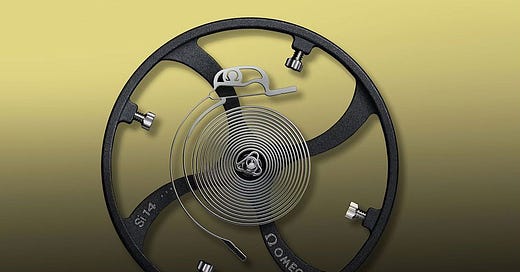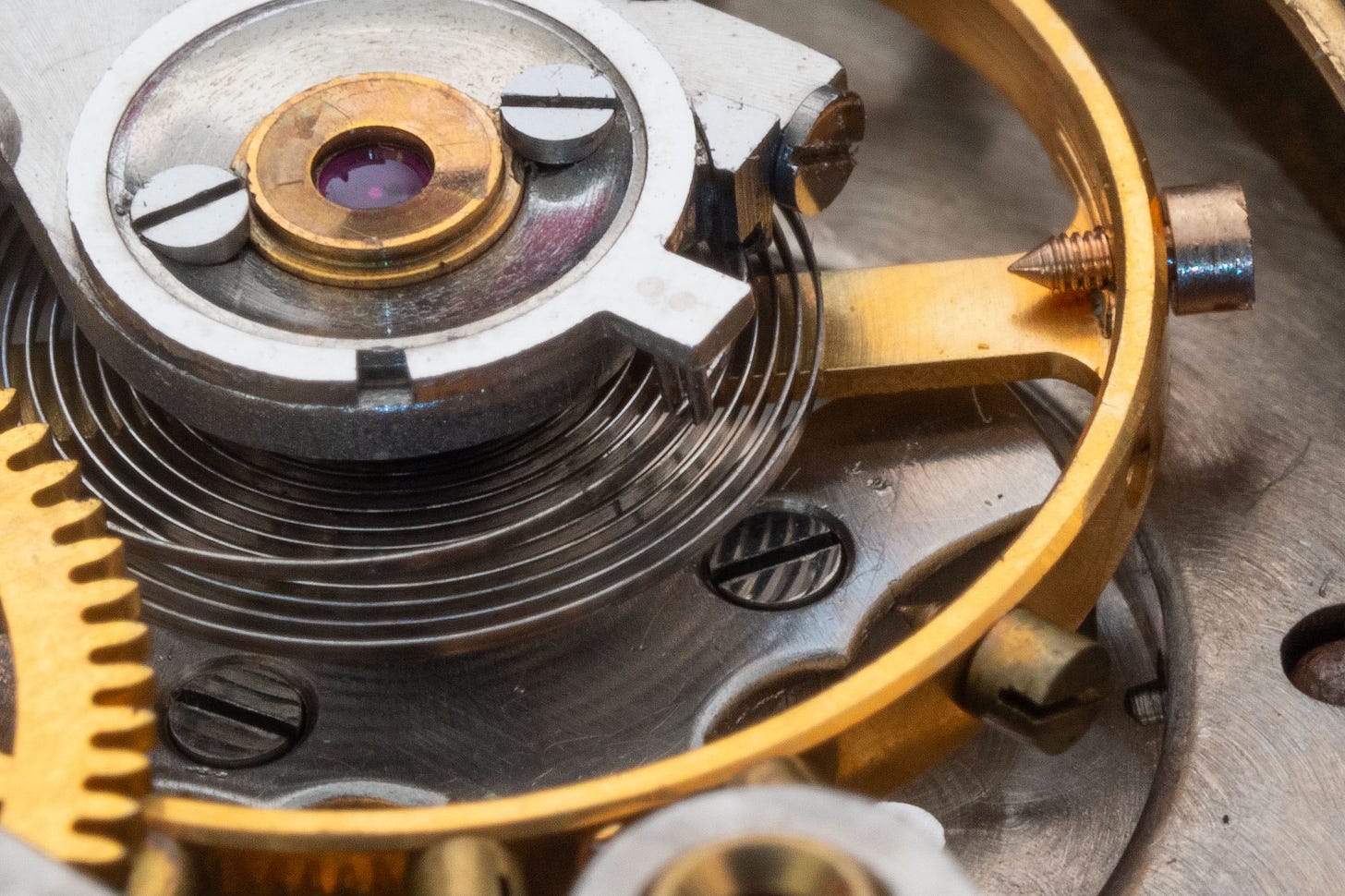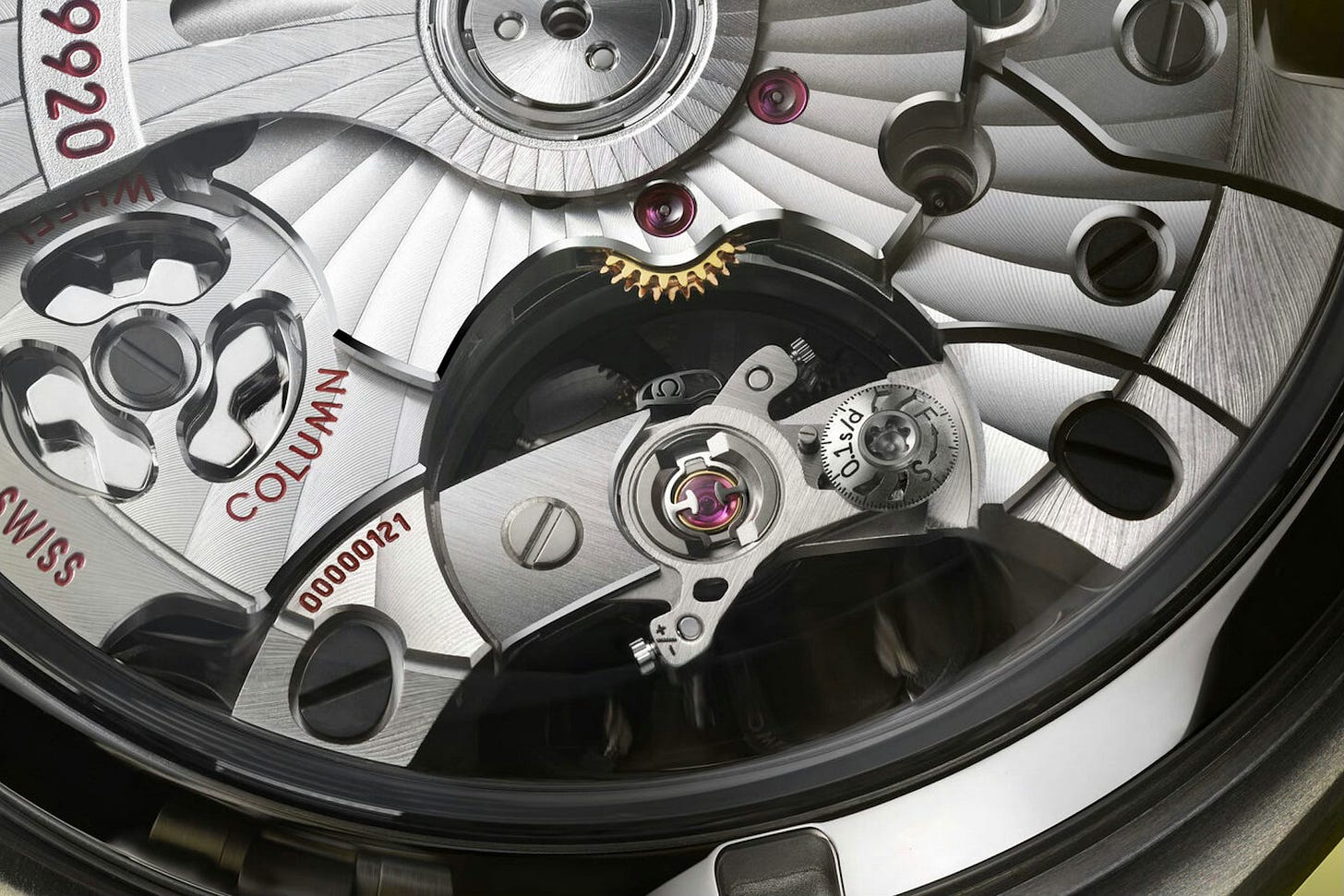The British Horological Institute Has The Real Tea On Omega's Spirate System
Subtle, sophisticated, and ... scalable?
I promise to change it up from mulling over Omega’s innovations in timekeeping and their impact on their own watches and on fine watchmaking in general the next time I do a post here, but I ran across something last week that I thought was pretty insightful and which offered a lot of clarity on something that generated a lot of confusion when it was launched. That something is Omega’s “Spirate” system, which was announced in January of 2023 and which generated quite a bit of interest, as well as a fair share of confusion.
The Spirate system is a fine adjustment system – a very fine adjustment system which allows the rate of a movement to be adjusted in 1/10th of a second increments.
Regulating A Watch
Normally there are only a couple of ways you can change the rate of the watch. The first is to change the moment of inertia of the balance, which you can do by changing the position of inertial weights on the rim. There are several different systems for doing this including Patek’s Gyromax system and the Rolex Microstella system.
The intuitive analogy that usually gets trotted out is a figure skater pulling in their arms, which makes them spin faster without any additional energy input. The physics behind this is conservation of angular momentum; as the center of mass moves inward, the amount of rotational energy has to stay the same, so the angular velocity increases. Using timing weights on the balance is challenging because when you change the position of the weights you have to make sure you don’t upset the poise of the balance.
The other way you can regulate a watch, is with a device called, unsurprisingly, a regulator.
This is a regulator from an American Waltham pocket watch – the basic system is the same even in modern watches, which use regulating systems like the Etachron system. To regulate the rate of the watch, you move the regulator sweep clockwise or counterclockwise. The two pins on either side of the terminal curve of the spring, control the effective length of the spring. Shorten the effective length and the watch runs faster; lengthen the effective length and the watch runs slower.
What’s really happening, though, is that you are changing the stiffness of the spring when you move the pins in or out along the terminal curve. The stiffness of a spring in the equation that describes the behavior of a spring in classical mechanics (Hooke’s Law) is given by the constant K, which is specific to an individual spring.
The Spirate System
This brings us to the BHI article on the Omega Spirate system, which I recommend highly to anyone interested in understanding what the system means and how it actually works; it’s by far the clearest explanation I’ve seen anywhere. This is the Spirate system as the BHI story labeled it.
The Spirate system consists of a silicon balance spring with a complicated secondary spring, shaped like an archer’s bow, attached to the outer terminal curve of the balance spring. This secondary spring has two components – the Loading Beam, and the Spirate Blade. This is what the whole system looks like, assembled in an actual watch.
The adjusting cam on the right can be rotated to change the position of the Loading Beam Tip. This in turn changes the stiffness of the balance spring. The whole thing’s kind of a game changer, at least as far as I can see. Normally, regulating a balance with timing weights involves careful rotation of the weights to change the moment of inertia. In traditional hand-adjustment and regulation, this is a painstakingly slow process because you have to check any change in rate against a time reference, and you have to make sure you haven’t put the balance out of poise when you moved the weights. Obviously, both Omega and Rolex (and other brands) have figured out a way to industrialize the process and how either brand does this is something I’d love to investigate; for something so truly essential to how their watches perform, the process is almost totally opaque.
However even under the best of circumstances, the process has to be a little fiddly – turning the screws on a Microstella balance means working with an adjusting tool at right angles to the plane of the balance rotation. Like I said, I’d give my eyeteeth to see what this part of the process looks like at Rolex and/or Omega (or both, why do I have to choose) because it’s right at the heart of how real precision in modern industrialized watchmaking is achieved. That aside, though, the real benefit to the Spirate system seems to be the ability to really finely regulate a watch in a more straightforward way, although the tradeoff is a more complicated movement.
It might actually pay for Omega to do it though, and given the number of watches they produce, economies of scale might make it economically viable – after all this is the company that industrialized the co-axial escapement. If it means Omega can roll out a new, tighter standard then so much the better, although the jury is still very much out on that question – so far the Spirate system exists in just one watch. Like the Laboratoire de Précision, it exists so far, mostly as a PR and marketing exercise and moving Omega’s entire, and massive, production of all its references into using the Spirate system would be no joke to put it mildly; we’re talking a fundamental change to the production lines of dozens of references and hundreds of thousands of watches. But I give Omega credit for putting in the work in the first place.
There are a couple of other thoughts. The first is that, if we needed another one, this is proof that modern mechanical watchmaking is now largely a matter of high tech materials science. I would personally rather have one 19th century observatory pocket tourbillon than a thousand Spirate Super Racing watches but then, I’m getting older and more bitter about the loss of traditional fine adjusting skills by the minute so you can’t go by me. I’m on the fence about this whole thing anyway; the truth is that ever since balance springs switched from blued steel to Nivarox-type alloys, high precision in watchmaking has had less and less to do with hand-work (and today it has almost nothing to do with hand-work at all) and more and more to do with mechanized precision engineering.
The second thought has to do with how the Spirate system actually works. Thanks to the BHI article, and Justin Koullapis (who has also written one of the very few coherent analyses of the Armin Strom resonance system) it seems clear that the Spirate system works in a new way, on a very old and very well known essential principle, which is that if you change the spring coefficient K, in a balance spring, the rate of the balance will change. The BHI article seems confident that messing with the K of the spring in the way that the Spirate system does, won’t produce any other problematic effects (fiddling with the terminal curve of a balance spring is generally asking for trouble, but the article says that Omega has that problem under control).
Still, it’s worth reflecting on the fact that the basic principles of regulating a watch haven’t changed. (I think it’s also worth noting, albeit parenthetically, that “adjusting” usually means “adjust to positions, isochronism, and temperature” and “regulating” means the somewhat narrower but related process of regulating the rate of the oscillator system; they’re not actually interchangeable terms). You really have only two options – you can change the moment of inertia of the balance, or you can change the effective K, or spring constant, of the balance spring. If Omega’s found a way to do the latter that gives an order of magnitude better accuracy and better rate stability, though … well, that’s a big deal. Whether it’s something that just sounds impressive in a press release, or it’s something that Omega will undertake to implement across its larger production lines (which would be a very costly endeavor) remains to be seen.








Great article, Jack, as is the BHI article. This whole topic--essentially, the pursuit of accuracy/precision in wristwatches--is one that's always confounded me. On the one hand, I love mechanical watches, the gears and springs and the resulting "aliveness" that they somehow bring to an inanimate object in a manner that no quartz watch ever can. And of course, a watch being an instrument used to tell time, ever-greater accuracy/precision is a goal that's hard to argue against. So yes, cheers to Spirate's maybe getting us to within a second a day. Not bad. Not bad at all. And certainly more than adequate for almost any reasonable use. Especially if it doesn't end up doubling the cost of any Omega that incorporates it. So, in spite of what's going to follow, cheers to Omega!
But something else nags at me: what of the other costs of this pursuit of accuracy? The costs, that is, of moving ever-further away from the workbench, from the metals and oils that went into every watch made until maybe 20 or so years ago and thus made them unmistakably "alive"? For example, the dependence on advanced silicon technology. No, this isn't microchips, whose "wires" have widths of maybe a hundred atoms. But it's also hardly something that the proverbial "little old watchmaker" could ever have incorporated. Are these things bad? No, of course not, but they do suggest a spectrum of sorts--at one end, the most basic end, would be a watch that could have been made by Breguet himself back in the day. Just metal, and totally makable in a Breguet-like workshop back in the 1800s. And the other end? Well, depends on how you limit the conversation--obviously the other extreme would be GPS-controlled watches accurate to a second per life-of-the-universe days. But let's ignore those for now, and set other limits to the "more accurate" end of the spectrum.
One limit would be "what could Breguet use, back in the day?" Metal, obviously. No silicon. Spirate need not apply. And certainly not quartz. But you can tinker with things like innovative escapements, e.g. Daniels' coaxial, maybe not improving accuracy but maybe improving maintenance intervals.
Another, less stringent, limit, might be "gears and springs." Any material you'd like, no matter how technologically advanced, as long as it's just gears and springs. Spirate gets to play in this game, and probably represents the current opposite extreme of the spectrum from the basic "what could Breguet do" end of things, as long as we limit things to gears and springs.
But nowadays, how much point is there in pushing this end of the spectrum? One second a day is great, but even if we forget about radio- or GPS-controlled watches, Rolex has reached +/- 2 seconds per day with everyday mechanical movements, and going WAY out there, Citizen has developed a quartz watch that's good to one second per 365 days. That's more than two full orders of magnitude better than Spirate. And for (probably, if Omega incorporates it into their overall line) about the same price. So here's Spirate, which (maybe) your AD can adjust to a second a day--and here, for not all that much more money (well, at least at list price...) there's Rolex, which is good for 2 seconds a day right out of the box.
What, in the end, is the best accuracy that we can expect from the "basic Breguet" mechanical watch? One that can be made by a watchmaker in a workshop much like Breguet's, without silicon, without CNC machines, made more or less the way Breguet did? Would a watch like that be acceptable these days? Would it keep time to within, say 10 seconds a day on the wrist? Five? Three?
And, of course, if we limit ourselves to that sort of watch, how scalable would its manufacturing be? Would it be possible to make, say, 500,000 such watches a year? Or would they be so limited in production as to be, well, Dufour Simplicities? Because ultimately, to me, "that sort of watch" would be my mechanical watch preference, rather than the silicon-enhanced versions that are coming out these days--I guess I'm kinda with you on this score: get me a functional 19th century observatory chronometer and I'll be a very happy man! (And dead broke, but hey, we can't have it all, and meanwhile, yes you're taking my GPS-controlled Citizen away from me over my dead body! Different horses for different courses, as they say.)
Thank you for the thorough explanation, I'm more impressed now than when it was announced. This is the kind of writing current HODINKEE is lacking: someone with deep expertise explaining watches from the engineering side with a heavy dose of history and a splash of philosophy.